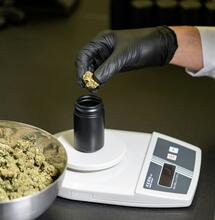Parents Say Andrew Cuomo Isn't Doing Enough to Help Their Sick Kids Get Medical Marijuana

Cuomo signed NY medi-weed bill into law in July, but it'll take 18 months to fully implement
Cuomo signed NY medi-weed bill into law in July, but it'll take 18 months to fully implement
SOURCE: www.huffingtonpost.com
AUTHOR: Carly Schwartz
NEW YORK -- New York Gov. Andrew Cuomo's administration has asked the Justice Department twice in as many months for permission to import marijuana from other states on a limited basis so certain critically ill patients aren't forced to wait until New York's medical cannabis law takes effect in January 2016.
Despite Cuomo's overtures, several mothers whose kids suffer from debilitating -- and potentially deadly -- seizure disorders say the New York governor isn't doing nearly enough to fight for emergency access to medical marijuana, which has proven successful treating children with similar conditions.
"While reaching out to the DOJ is a meaningful first step, there are other additional steps [Cuomo] can and should take," said Missy Miller, whose son, Oliver, had a stroke in utero that now causes hundreds of seizures on any given day. "Every day that passes, we lose more of Oliver to these seizures."
Cuomo signed New York's medical marijuana bill into law in July, but the measure specifies it will take 18 months to fully implement the program. Advocates have criticized the legislation for being watered down with compromises, including the last-minute removal of a provision that would have allowed patients to access medical cannabis from other states on an emergency basis while the law goes into effect. Since the law passed, three children in New York with severe seizure disorders have died.
"It takes a while to get the system up and running, but these children can't wait," Gabriel Sayegh, a managing director for the Drug Policy Alliance, told The Huffington Post, noting that Cuomo is now asking the Justice Department for permission to implement the same emergency access plan he erased from the final version of the bill. "The governor was very specific about taking that provision out, and now we're back to talking about it."
In addition to calling on the Justice Department for guidance, Cuomo has the authority to allow specific local producers to bypass the permitting process and begin cultivating medical marijuana, Sayegh added. Moreover, the governor has the power to call a special session of the state legislature to add the original emergency access provision back into the law.
Still, Sayegh and other marijuana-reform advocates said Cuomo's letters to the Justice Department -- one in August and a second on Friday -- are a first step toward improving access for needy patients. The Justice Department faced additional pressure from lawmakers on Monday, when both of New York's U.S. senators, Democrats Kirsten Gillibrand and Charles Schumer, sent a letter echoing the Cuomo administration's request.
"As Members of Congress whose constituents suffer from these illnesses, we feel that the federal government ought to do what it can to help these children," the senators wrote. "This measure is a healthcare imperative."
Although 23 states and the District of Columbia have legalized medical pot, the federal government still considers cannabis an illegal substance with no medicinal value. Over the past few years, Justice Department officials have cracked down significantly on state-legal marijuana operations throughout the country. A 2013 memo issued by Deputy Attorney General James Cole listed eight priorities federal prosecutors would consider when enforcing pot laws. One specifically dealt with "the diversion of marijuana from states where it is legal under state law in some form to other states." It's unclear whether that priority extends to instances where, like the situation in New York, the pot would be transferred between states where medical marijuana is legal.
Sayegh said he hopes the letters to the Justice Department will force federal officials to clarify their stance. "It's one thing to transfer medical marijuana from a state where it's legal into the black market of another state," he said. "It's another to transfer it to another medical marijuana state in order to serve a small population of patients."
In order to treat children with seizure disorders, New York would import a specific strain of marijuana high in cannabidiol, a non-psychoactive ingredient, and low in THC, the compound that causes pot smokers to feel "high." Kids with similar illnesses in states like Colorado and California, who typically ingest the cannabis in the form of a tincture or oil, have seen exceptional results.
"It's completely remarkable," Colorado-based Dr. Margaret Gedde told The Huffington Post earlier this year.
One of Gedde's patients, 10-year-old Zaki Jackson, used to endure thousands of seizures every day. He had been prescribed 17 pharmaceutical medications, which caused side effects like weight gain and insomnia, but failed to stop the seizures. He has been seizure-free since beginning his medical marijuana treatment more than a year ago.
"He's now able to start developing as a normal child. He's a delightful, charming kid," Gedde said. "Before that he couldn't even be in contact with people. It was a dramatic, complete change."
Cuomo was staunchly opposed to legalizing medical pot in New York until he heard the stories of families like Jackson's. Wendy Conte, whose 9-year-old daughter Anna died earlier this year from a seizure disorder, repeatedly lobbied legislators on her family's behalf and is largely credited with bringing New York's medical marijuana measure to fruition.
"[Anna's] courage, and the courage of her family, directly led to my sponsorship of legalized medical marijuana in New York," said state Sen. Mark Grisanti (R-Buffalo), one of the first Republican lawmakers to publicly support the medical cannabis bill, in a statement following Conte's death. "She was a courageous little girl, who suffered as no child ever should."
Some conservative states are following suit: Florida passed a limited-access medical cannabis law over the summer, and members of the Georgia state legislature are considering a similar program.
Sayegh said Schumer's support for an emergency access program in New York signals a national shift on the issue. "For many years now, Schumer has been one of the most ardent drug war bureaucrats in Congress," Sayegh said. "He's not known in any way as a person who has called for sensible reforms on these kinds of policies. As limited as his letter [to the Justice Department] is, it's a sign of a changing dynamic on this issue."



